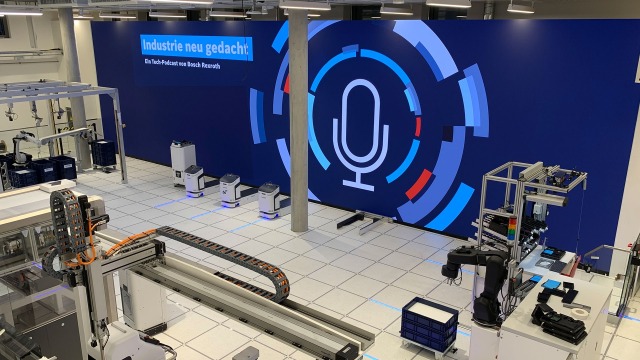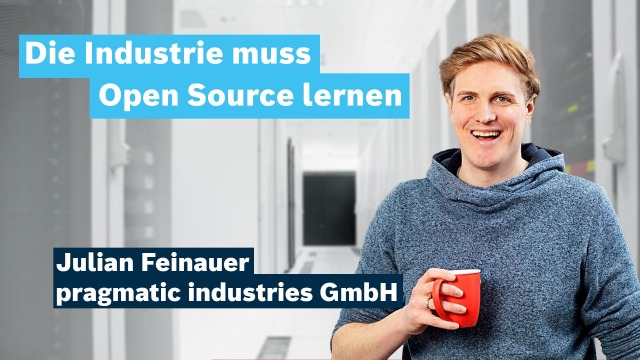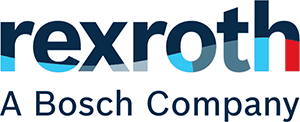

Products
OverviewIndustries
OverviewService
OverviewBuy
OverviewCompany
OverviewProduct groups
OverviewEngineering
OvervieweConfigurators and Tools
OverviewEDI (Electronic Data Interchange)
Overview

Dr Julian Feinauer is a mathematician and managing director of Pragmatic Industries. With his company, he is part of crtlX World and relies on open source for his products. In the interview, we talk about hobbyists, threats and special tasks for management.

Dr Julian Feinauer: Europe is currently the place to be when it comes to open source. Now we just have to convince the many SMEs, because open source is not (just) for hobbyists, but delivers enormous financial and technological added value for companies and makes them independent.
Feinauer: We work with some machine builders and develop SaaS or PaaS solutions in software projects. We rely entirely on open source software. Carsten Emde from OSADL once told me: "You can't sell software in bags. If the customer is unlucky, the software is no longer worth anything after ten seconds because the rules have changed or vulnerabilities have been found." Carsten is right. Software is a service we sell, not lines of code. In the run-up to IT projects, service providers and customers often engage numerous lawyers to secure the IP or to settle the rights to the code in the event of insolvency, for example. This is often expensive, costs a lot of time and with an open source approach these problems can be solved quickly and easily.
Our client can use the code, change it and should we go bankrupt, they can continue to work with any other team of developers. That is sovereignty in development. Many small and medium-sized enterprises in particular are worried about being dependent on us "IT shops". With an open source approach, this fear is a thing of the past. Our client can also change horses during the project (we do not recommend this, of course) or continue working with another provider later on. He is free and unbound. He pays us for the development, the service.
Feinauer: Open source provides the industry with security in the processes. The foundations pay scrupulous attention that the development is traceable, that software parts lists are available and that security gaps are closed quickly. Many of us at Log4J were shocked and quickly the open source community was sharply criticised. Some industrial companies said they could not rely on us. But the community quickly took remedial action. Some people probably overlooked that. Those who now think in terms of proprietary systems again and hope to be able to close security gaps more quickly are very much mistaken.
Feinauer: When we bring up open source with customers, the people in charge still often flinch. Because it is still unclear to many industry leaders how we earn money in the end. Nobody likes unclear business relationships. How can you earn money with free beer? It's quite simple: through service, documentation, maintenance or extensions and special requests. So stop selling software.
Feinauer: We need to build up knowledge and special praise therefore goes to Wolfgang Gehring from Mercedes-Benz. He and his team have announced an Open Source Manifesto. It is intended to encourage employees to actively pursue open source software development. At Mercedes-Benz, people should look for open and inner-source alternatives before he or she writes their own code or uses proprietary alternatives. Employees should make an effort to be active in the company's existing inner-source communities. In addition, they should contribute to open source projects as part of their daily work. Every employee should always act responsibly in the open and inner-source communities, with care and respect in content and communication, in order to maintain a positive image for themselves and the company, the manifesto states.
Feinauer: The Chinese government is pushing the issue massively - especially in industry. A new ecosystem for the topic is emerging there. That's why our employees have to learn open source, we have to be able to understand the code that is freely offered to us, because then we won't fall into a dependency trap. We have to make ourselves fit for applications from Github and Co. on all levels. This is the only way we can remain digitally successful and independent at the same time. That's why open source is also a management issue. Yes, I know the ladies and gentlemen have other worries right now, but they have to make their organisation fit in this topic, dear CEOs, otherwise we will be threatened with code dependency from the USA or China after gas dependency. Employees should learn open source in their working hours. We cannot demand that our colleagues do this on the side in the evening.
The whole interview and other episodes on the factory of the future in our tech podcast channel "Industry rethought" on all known platforms or you can subscribe directly here via Podigee (only available in German).
Contact person for the Bosch Rexroth Tech Podcast: Susanne Noll
Please feel free to contact Bosch Rexroth!
